28 Different Types of Gorgeous Orchids for Your Home or Garden

Cymbidium Orchids
It’s said that flowers are meant to remind us of the world’s beauty. And with their captivating colors, heavenly aromas and whimsical stature, there’s no doubt they do just that. Though, since there are so many gorgeous options, sometimes it can be hard to narrow down which ones you should grow yourself. If you’re going back and forth about it, a great flower to consider are orchids!
To learn more about them, we reached out to Samantha Hermann, of "HousePlusPlant" AKA “Your favorite plant teacher” on Instagram (with over 615k followers) and TikTok (with over 2M likes). “Orchids are great plants to have and can be found all over the world!” she tells Parade. “They’re relatively low maintenance and can provide a fun tropical pop of color.”
However, with over 25,000 species of orchids to choose from, which one should you get? Hermann suggests getting a Phalaenopsis, which is also referred to as a moth orchid. “Phalaenopsis are very popular,” she says. “They are the best orchids to get if you don’t have much experience with houseplants because they’re inexpensive, easy to care for and have a large bloom.”
To learn more about how to take care of orchids, check out Hermann’s growing tips, followed by care guides for 28 different types of orchids, below! That way, even if you don’t have a green thumb, you’ll be able to keep your pretty plant happy and healthy!
Related: 40 Best Spring Flowers to Beautify Your Backyard, According to Gardening Experts
Orchid Growing Tips
When it comes to caring for moth orchids, and any other types of orchid you may buy, Hermann explains that making sure your plant gets the right amount of light is key.
“My number one tip is to get it right in the windowsill as soon as you get home because light is the most important factor for orchids,” she reveals. “Orchids like bright shade/dappled sunlight, which is why placing them in east-facing windows is usually the best spot as the morning light isn’t as harsh.”
If you’re unsure if you found a good area for your orchid, Hermann says to keep an eye on their leaves because they’ll start to change color if they’re getting too much sunshine. “Their leaves will fade if the light is too intense,” she states.
Besides making sure your orchid gets the appropriate amount of light, the amount of water they get is also crucial for their survival. While each type of orchid requires a different amount, Hermann tells Parade there’s one trick she swears by to know when it’s time to water them.
“When an orchid’s roots look silver, that’s when you know it’s time to rehydrate them,” she points out. “Otherwise, their roots will be a light green, which means they are hydrated.”
Related: 35 Magical Fairy Garden Ideas To Enchant Your Backyard
28 Types of Orchids
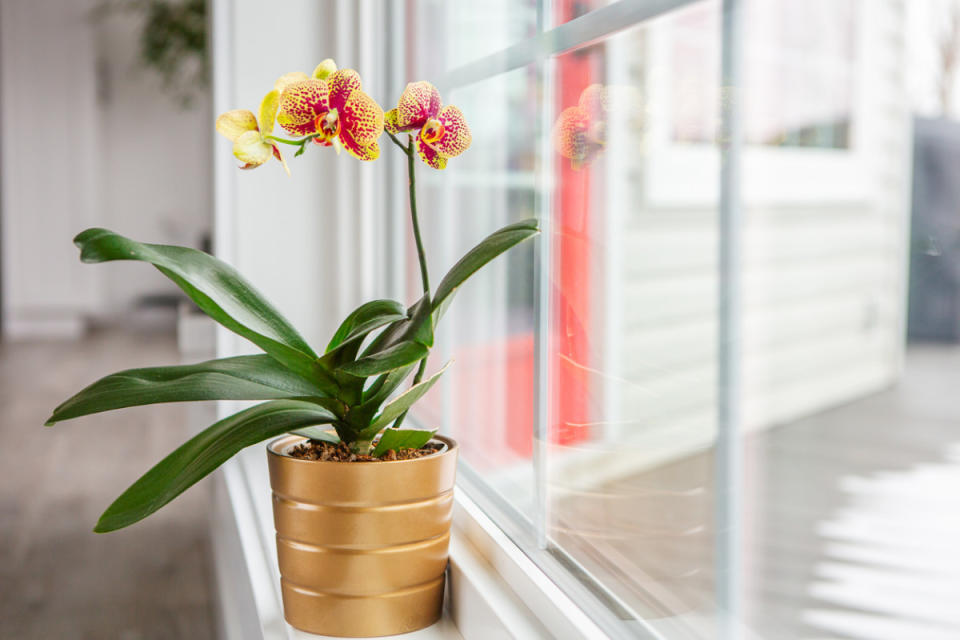
iStock
1. Moth Orchids (Phalaenopsis Orchids)
These orchids come in every color of the rainbow and are native to India, China, Indonesia, Australia and Southeast Asia. They do not require soil to survive and are typically sold at stores in pots with wood chips.
Care Guide
Light: Indirect light facing an east-facing window
Temperature: 70 to 80°F during the day, 60 to 65°F at night
Height: Up to 3 feet
Water: Twice a week whenever the soil becomes dry
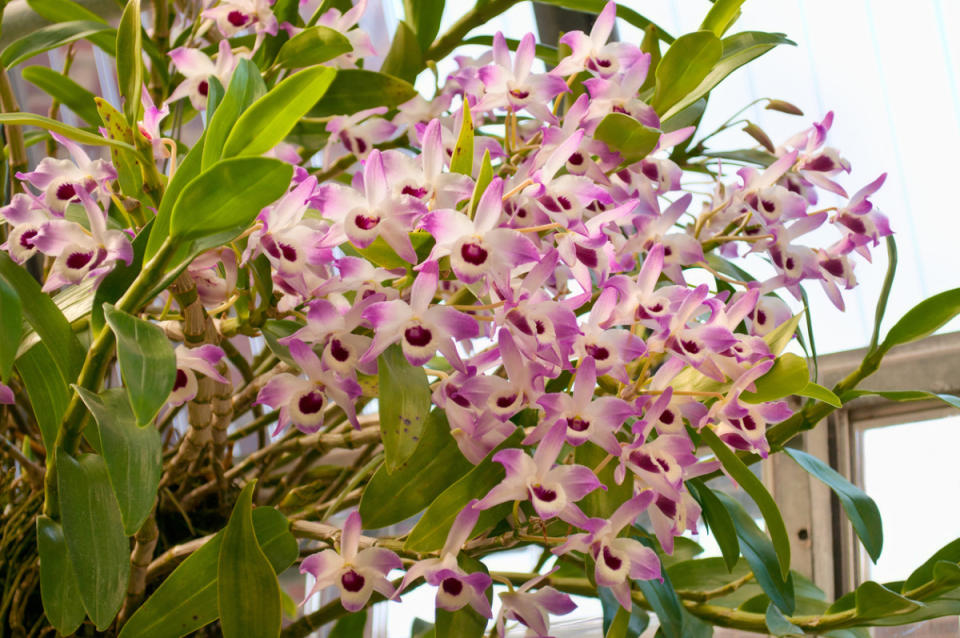
iStock
2. Noble Rock Orchids (Dendrobium Nobile Orchids)
This flower blooms from winter to spring. It has white and lavender/pink petals with a purple lip and a yellow-ringed dark interior eyespot, which make it stand out from other orchids.
Care Guide
Light: Indirect light from an east-facing window
Temperature: 70 to 80°F during the day and 55 to 65°F at night
Height: 11 to 18 inches
Water: Once every seven to nine days or when the soil is almost dry to the touch
Related: What Is Your State Flower? Your Guide to All 50 Blooms from Alabama to Wyoming
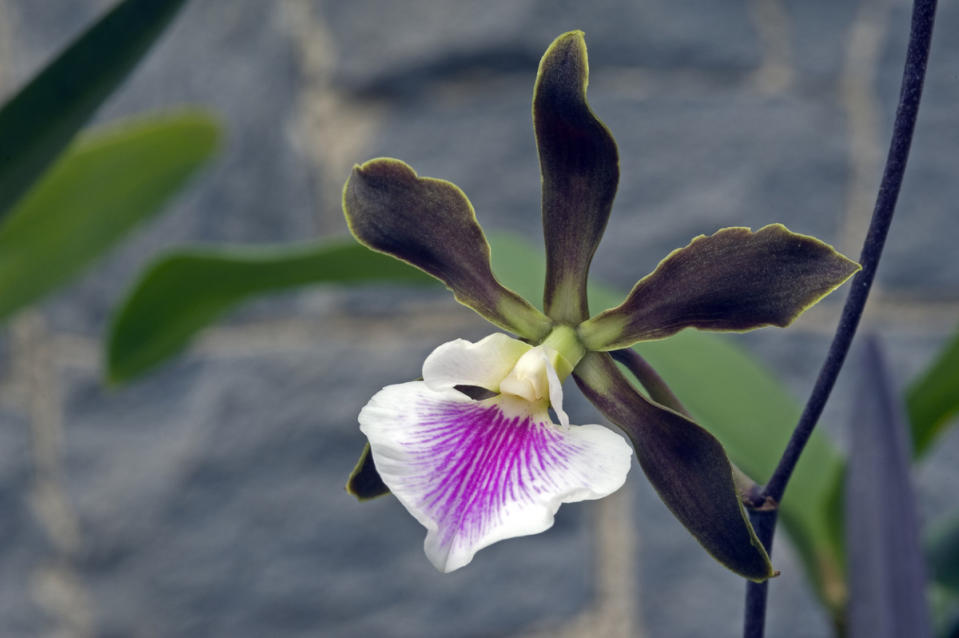
3. Encyclia Orchids
Upon first glance, this flower resembles an octopus thanks to its dangling petals and sepals. Besides their unique and aquatic-like appearance, their leaves are also statement-makers and can be a couple of feet in length.
Care Guide
Light: Medium to bright diffused light from an east-facing window
Temperature: 70 to 80°F during the day and 55 to 65°F at night
Height: 3 inches to 2 feet
Water: Twice a week and allow roots to dry out between watering
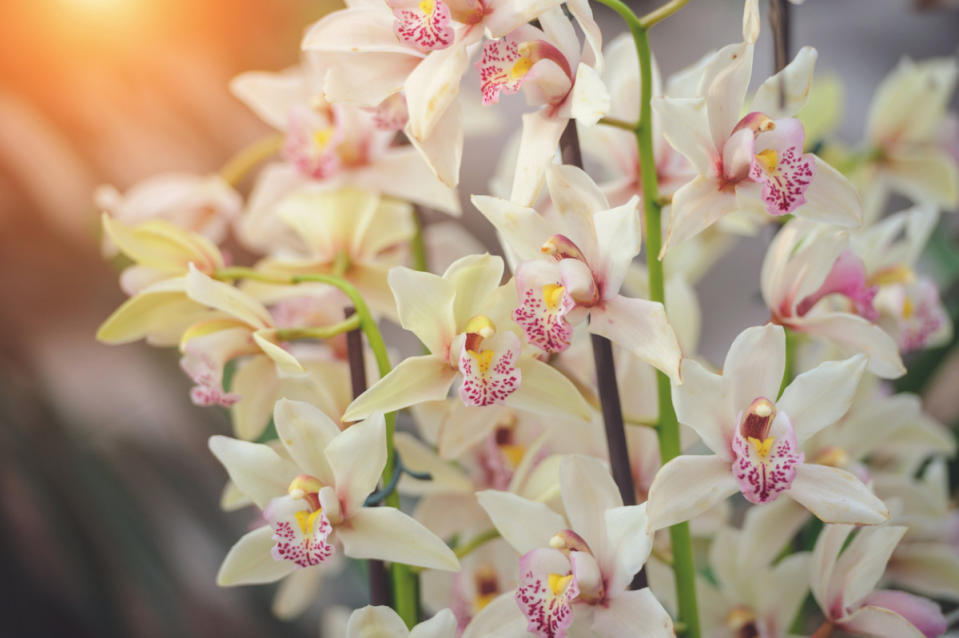
iStock
4. Boat Orchids (Cymbidium Orchids)
This tropical orchid is popular in Asia and Australia. It has multiple flower spikes that can be lime green, yellow, bright pink or red.
Care Guide
Light: Indirect light for at least 12 hours from an east or southeast-facing window
Temperature: 40 to 90°F during the day and 50 to 60°F at night
Height: 10 to 36 inches
Watered: Every other day and keep soil moist at all times
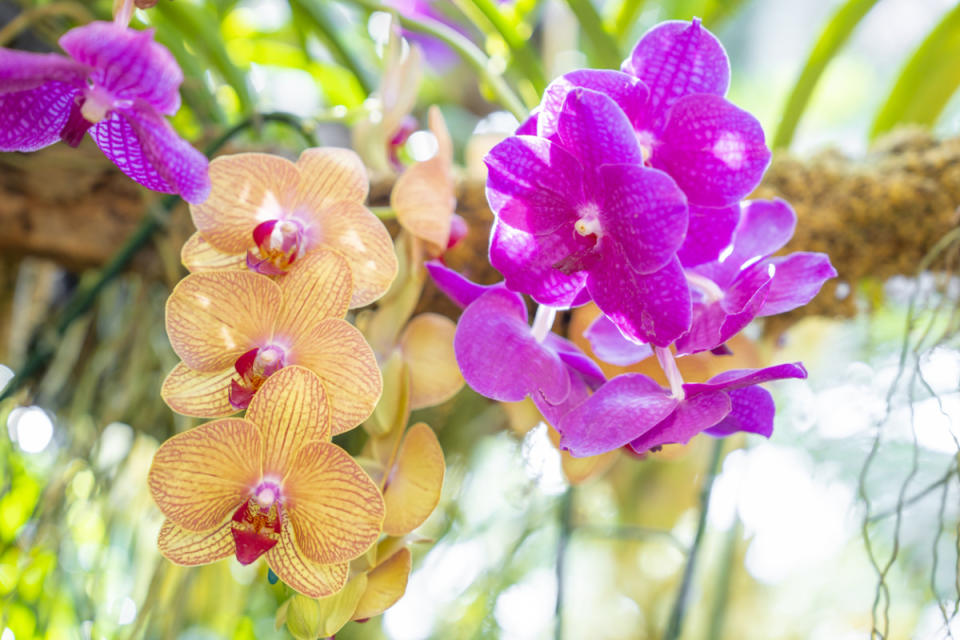
iStock
5. Ascocenda Orchids
Known for having colors ranging from pink and purple to orange, brown, scarlet or deep fuchsia, these orchids have petals that tend to roll under, making it appear like a cone of flowers.
Care Guide
Light: Bright indirect light from an east or south-facing window
Temperature: 70 to 80°F during the day, 60 to 65°F at night
Height: Up to 3 feet
Water: Once every five to seven days, as the soil begins to dry
Related: Create Your Own Butterfly Paradise With These 35 Plants and Flowers That Attract Butterflies
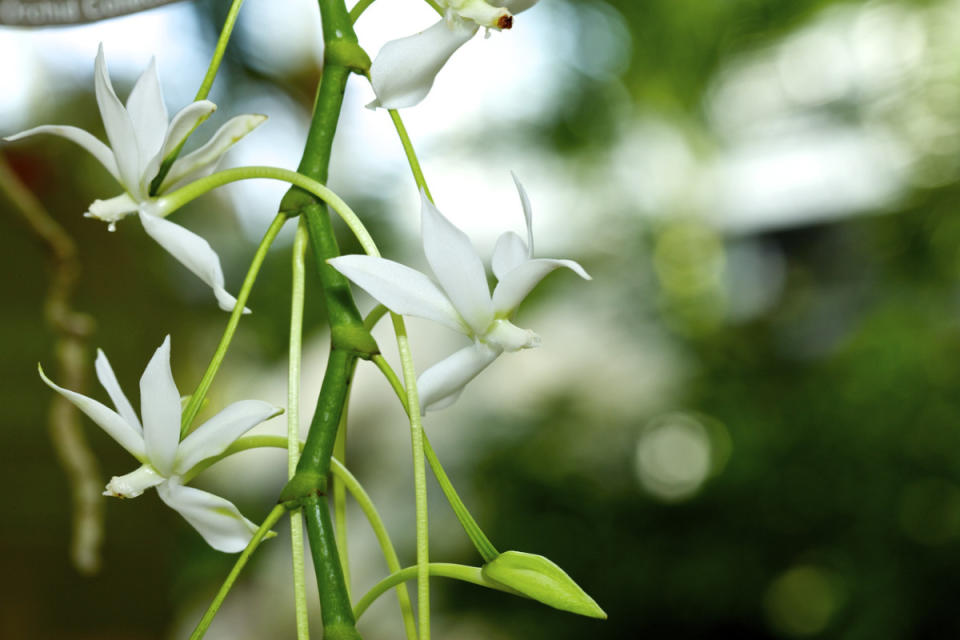
iStock
6. Aerangis Orchids
These orchids stand out from others thanks to their star shape. While their figure may be unique, their coloring is more subtle, as they are usually white, cream or yellow and have a long nectar-filled spur.
Care Guide
Light: Indirect sunlight for 6 to 8 hours from an east or south-facing window
Temperature: 70 to 75°F during the day, 60 to 65°F at night
Height: 6 to 24 inches
Water: Water every other day and allow the plant to dry out slightly after watering
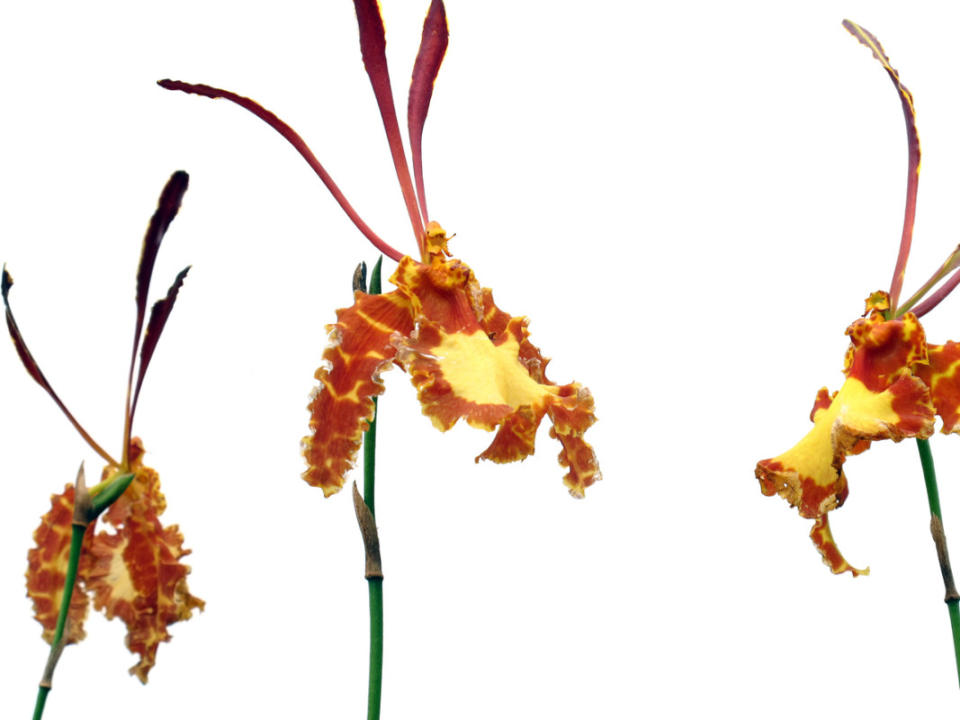
iStock
7. Butterfly Orchids (Psychopsis Orchids)
These butterfly-looking flowers have narrow upper petals that resemble antennae, while their larger sepals look similar to speckled wings. They are typically yellow in color with burgundy speckled dots.
Care Guide
Light: Bright, indirect light for 6 to 8 hours from an east-facing window
Temperature: 75 to 90°F during the day, 55 to 60°F at night
Height: Up to 16 inches
Water: At least twice a week, but allow the soil to dry out between watering
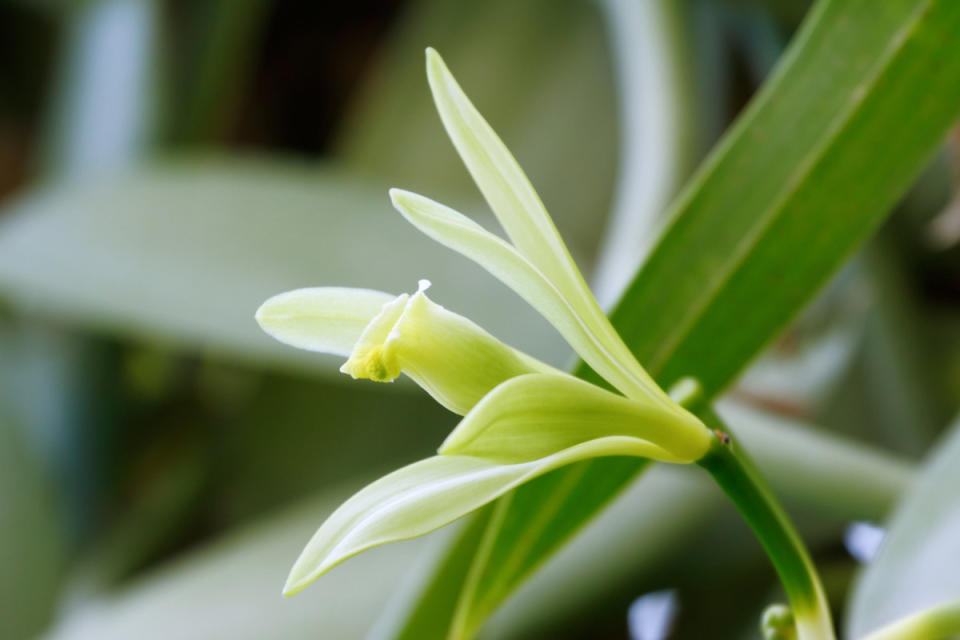
iStock
8. Vanilla Orchids
What makes this specific orchid different is that you’ll find them growing on evergreen vines. The flowers themselves are also less vibrant in color and tend to be a greenish-white shade that are flushed with yellow.
Care Guide
Light: Bright, indirect sunlight for about 6 hours from an east-facing window
Temperature: 80 to 85°F during the day, 60 to 65°F at night
Height: These vines can reach up to 300 feet
Water: Twice a week when the soil becomes dry
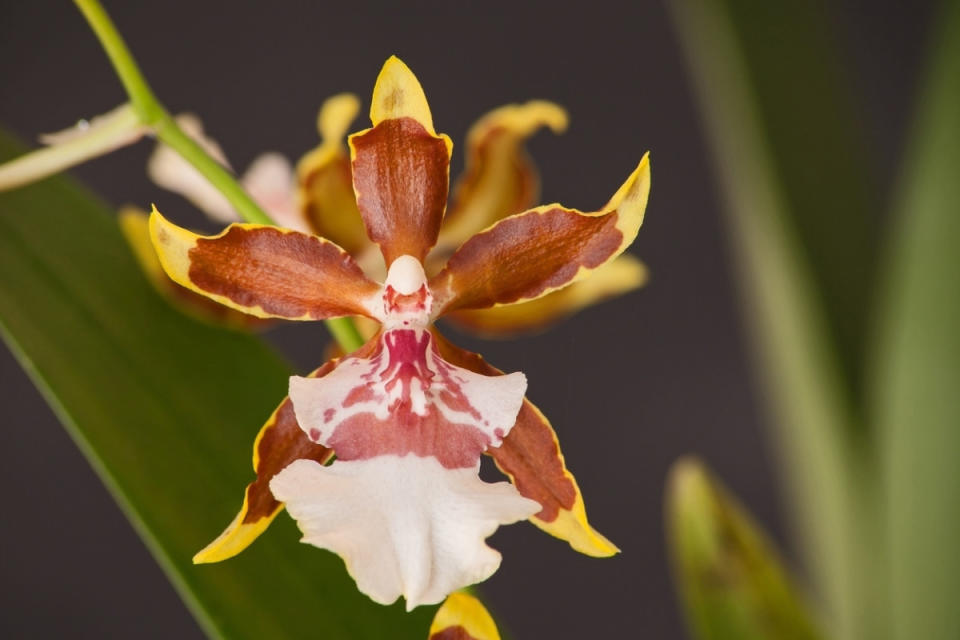
iStock
9. Trichocentrum Orchids
This orchid is truly dreamy. Each plant has pretty yellow flower petals with bright red or pink centers.
Care Guide
Light: Indirect light and never direct sunlight from an east or south-facing window
Temperature: 65 to 80°F during the day and at night
Height: Up to 5 feet
Water: Every two days when the soil dries out
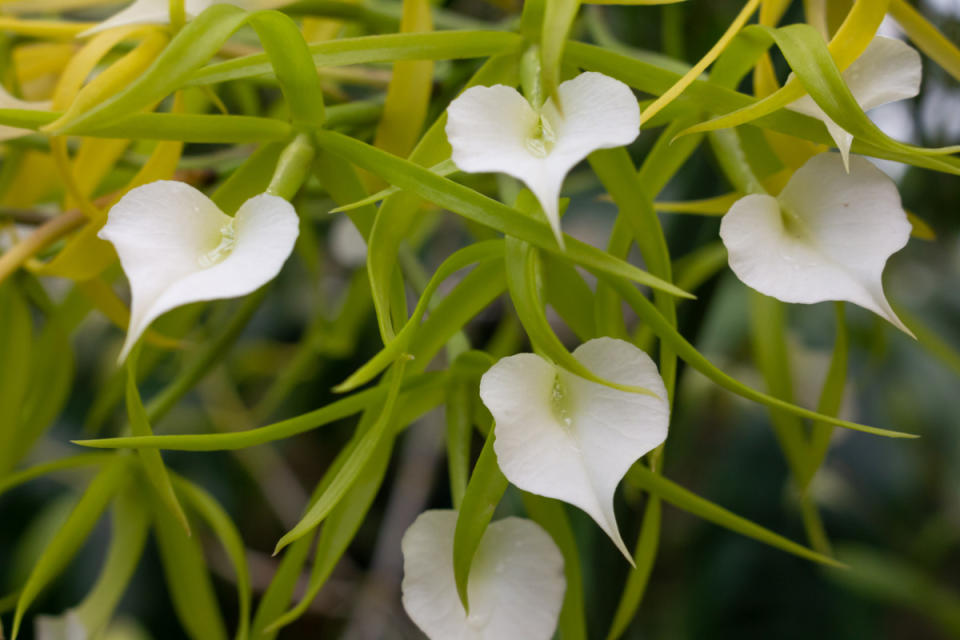
iStock
10. Ladies of the Night Orchids (Brassavola Orchids)
This pretty plant has white or green flowers with narrow petals. They get their nickname due to the fact that their sweet gardenia-like fragrance can be smelled in the early evenings each day.
Care Guide
Light: Intense, bright light from an east, south or west-facing window
Temperature: 70 to 75°F during the day, 60 to 65°F at night
Height: Up to 16 inches
Water: Twice a week when the soil dries out
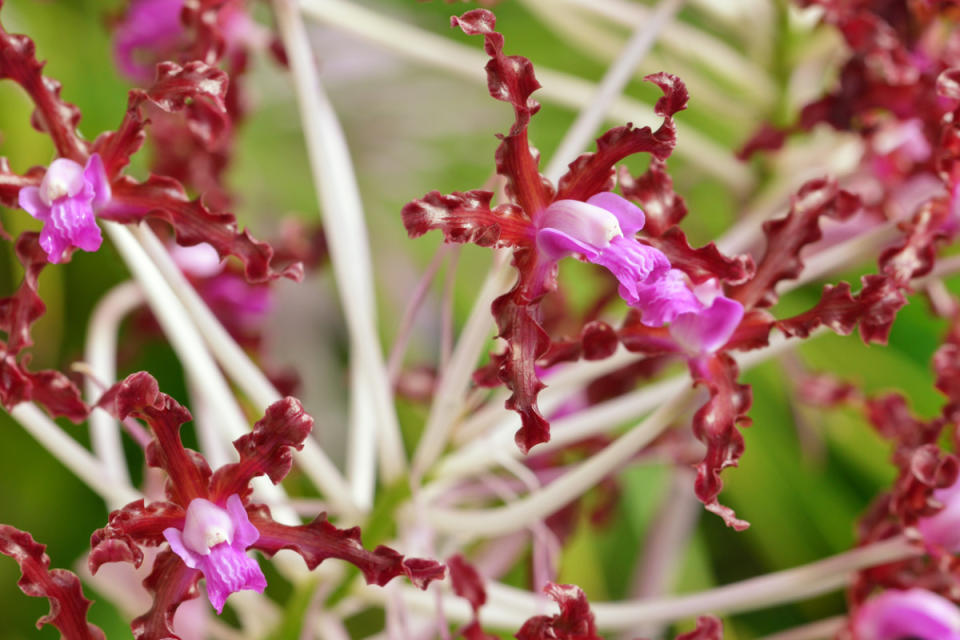
iStock
11. Laelia Orchids
You can find these plants growing in mountains in western Mexico to Bolivia. They typically bloom up to 12 flowers per stem and come in a variety of colors.
Care Guide
Light: Medium to high indirect light from an east-facing window
Temperature: 70 to 75°F during the day, 60 to 65°F at night
Height: Up to 10 feet
Water: Once a week or when the soil is dry
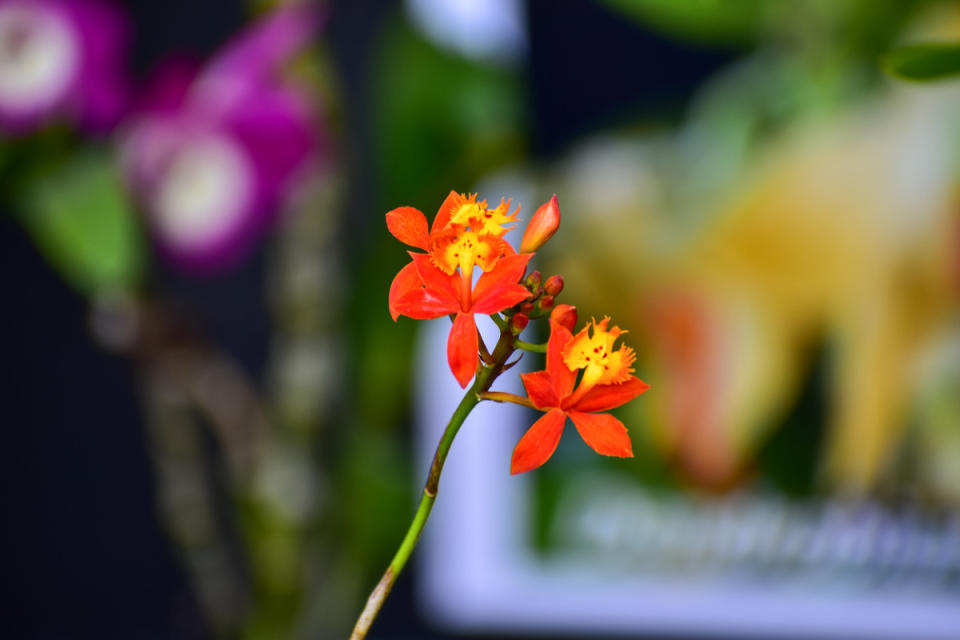
iStock
12. Reed Orchids
Native to Central and South America, this orchid produces clusters of small red-orange flowers with yellow lips. In some areas, they are referred to as “the poor man’s orchid” because they are cheaply priced.
Care Guide
Light: Bright morning light and indirect afternoon light from an east-facing window
Temperature: 60 to 90°F during the day, 55 to 60°F at night
Height: Up to 3 feet
Water: Once a week to keep soil moist
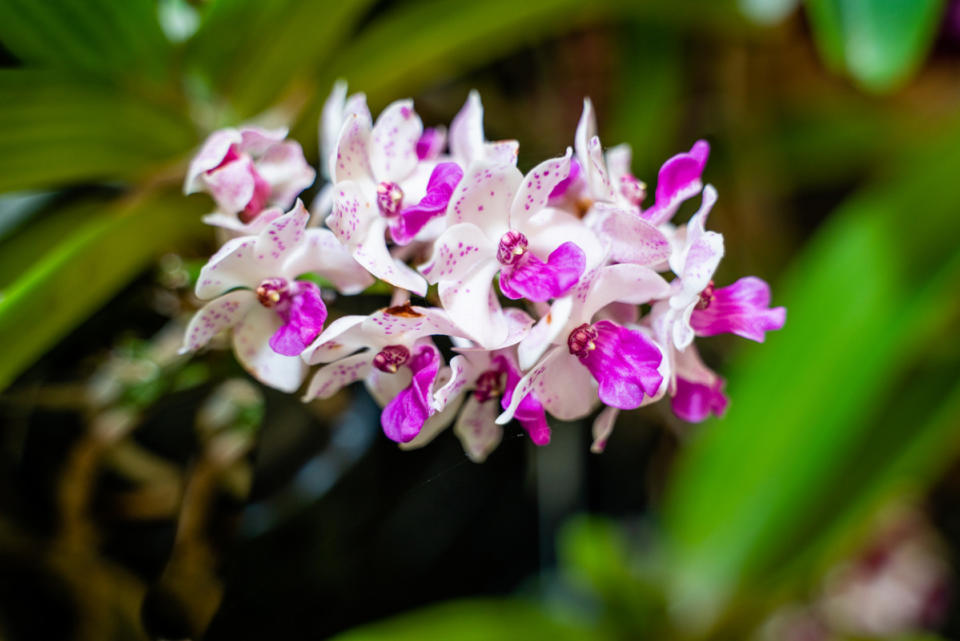
iStock
13. Foxtail Orchids (Rhynchostylis Orchids)
These tropical plants get their name because of the long plumes of tiny flowers that resemble fluff fox tails. They tend to bloom in the winter and early spring and have dainty purple clusters.
Care Guide
Light: Moderate, bright, indirect light from an east or south-facing window
Temperature: 65 to 75°F during the day, 55 to 65°F at night
Height: Between 1 to 2 feet tall
Water: Twice a week and misted daily
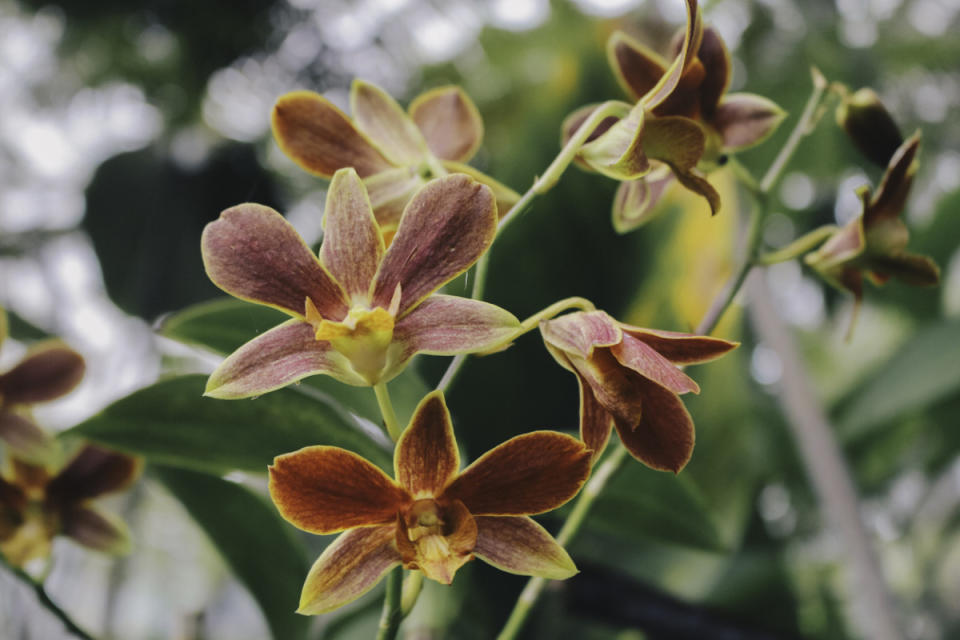
iStock
14. Catasetum Orchids
These warm-weather beauties are native to Central and Northern South America. They are also known for their waxy-like red flowers.
Care Guide:
Light: Bright diffused indoor light from an east-facing window
Temperature: 70 to 80°F during the day, 60 to 65°F at night
Height: 10 to 14 inches
Water: Three times a week while bulbs are forming and then reduce after plants flower to once a week
Related: Breathe Easier With These 34 Air-Purifying Indoor Plants for Your Home or Office
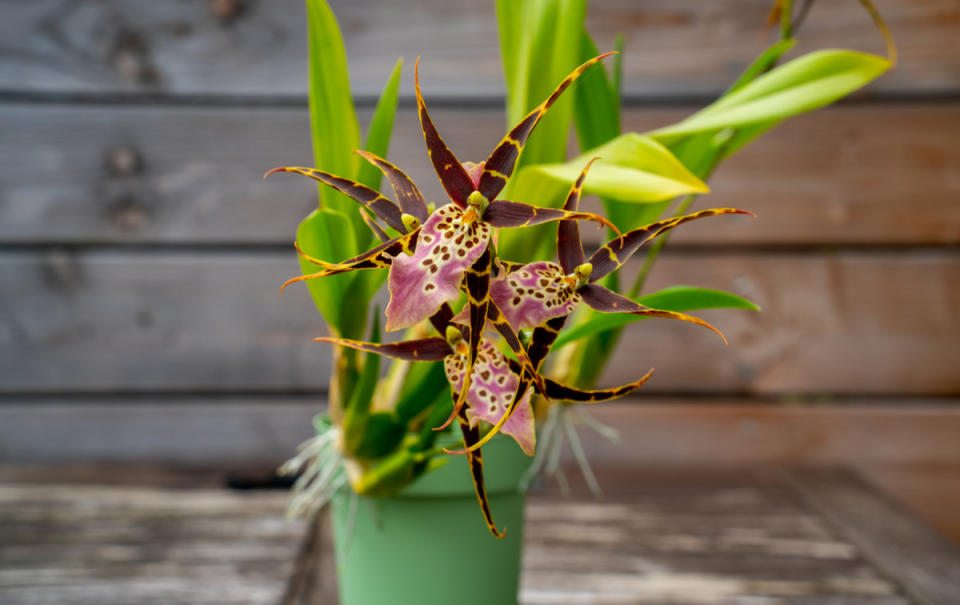
iStock
15. Spider Orchids (Brassia Orchids)
Don’t let this orchid scare you. While their petals may be long and thin with speckles, giving off a spider-like appearance, they are harmless.
Care Guide
Light: Indirect light from an east-facing window
Temperature: 65 to 75°F during the day, 55 to 65°F at night
Height: 1 to 2 feet
Water: Keep moist while growing, but switch to 0.8 cups of water each week once flower spike appears
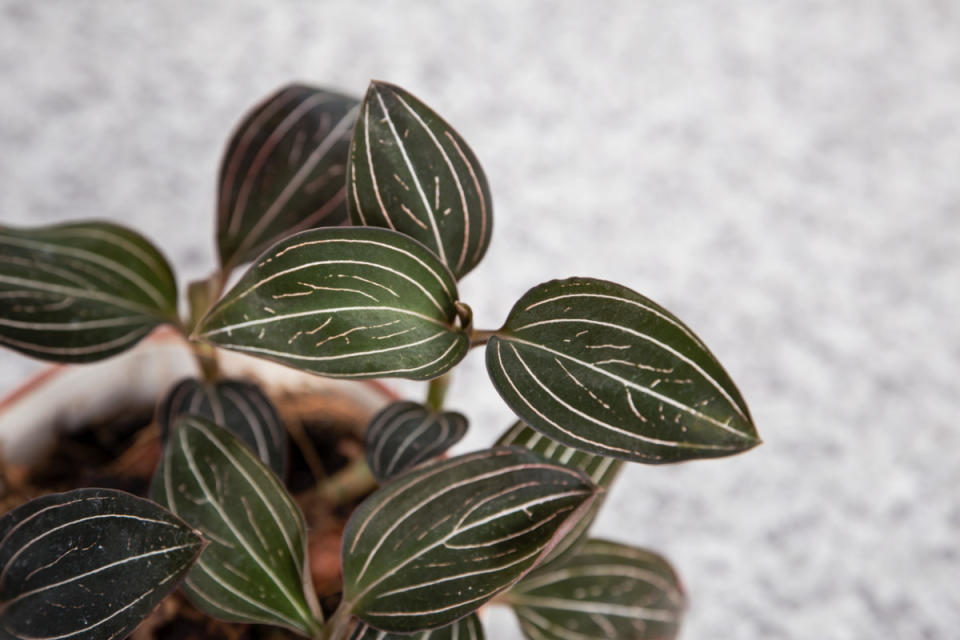
iStock
16. Jewel Orchids (Ludisia Orchids)
With velvety dark green leaves and stems filled with tiny white flowers, these orchids are breathtaking.
Care Guide
Light: Bright diffused light from an east-facing window
Temperature: 65 to 75°F during the day, 60 to 65°F at night (don’t let go below 50°F)
Height: 3 to 18 inches
Water: Keep soil moist at all times
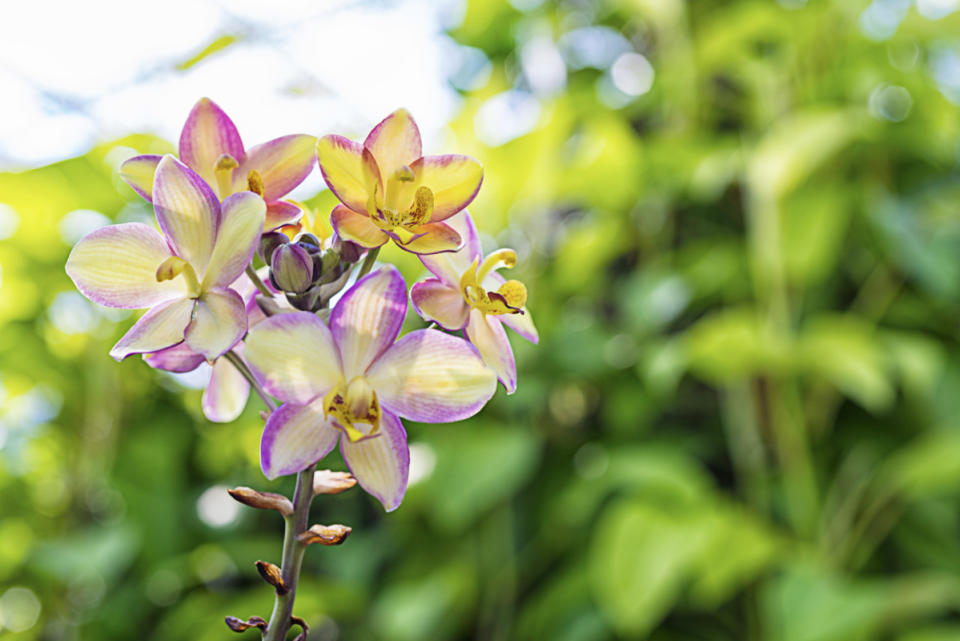
iStock
17. Spathoglottis Orchids
These have pleated leaves and small gem-like flowers that are typically purple in color. However, they can also be pink, yellow or white. Sometimes they are also known as Philippine ground orchids or garden orchids.
Care Guide
Light: Morning sun for at least 3 hours, then indirect light the rest of the day from an east-facing window
Temperature: 75 to 90°F during the day, 60 at night
Height: Up to 2 feet
Water: Once or twice a week when soil becomes dry
Related: Avoid Getting Eaten Alive This Summer With These 25+ Plants That Repel Mosquitoes
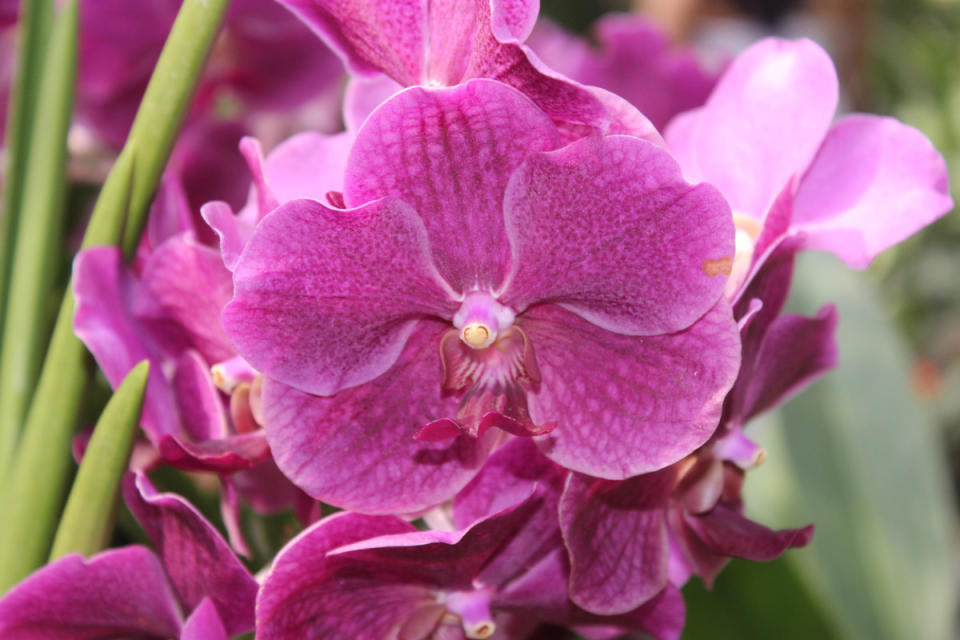
iStock
18. Waling-Waling Orchids (Vanda Orchids)
These orchids are native to the Philippines and have round-shaped petals that are a lavender hue with a splotchy red gradient pattern.
Care Guide
Light: Bright, partial sunlight from an east-facing window
Temperature: 84 to 88°F during the day, 69 to 71°F at night
Height: Up to 4 feet
Water: Daily watering in the morning
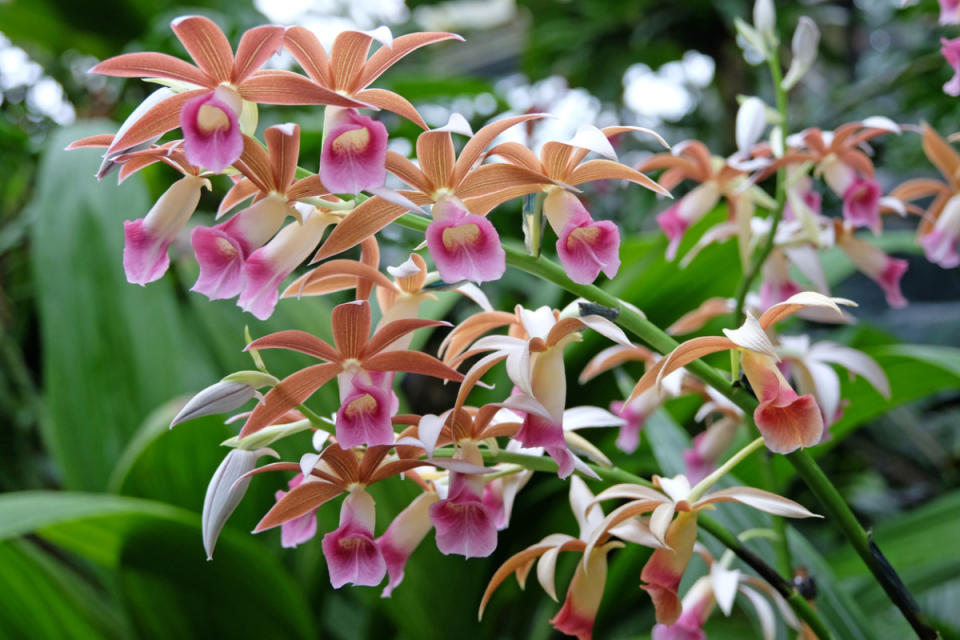
iStock
19. The Nun’s Orchid (Phaius Orchids)
A common flower in Asia, this orchid has beautiful, fragrant flowers that grow on stalks. Each flower is white on the outside with purplish pink on the inside.
Care Guide
Light: Bright light with shady, such as from a north-facing window
Temperature: 60 to 70°F during the day, 55 to 60°F at night
Height: Up to 4 feet
Water: Once a week in the morning
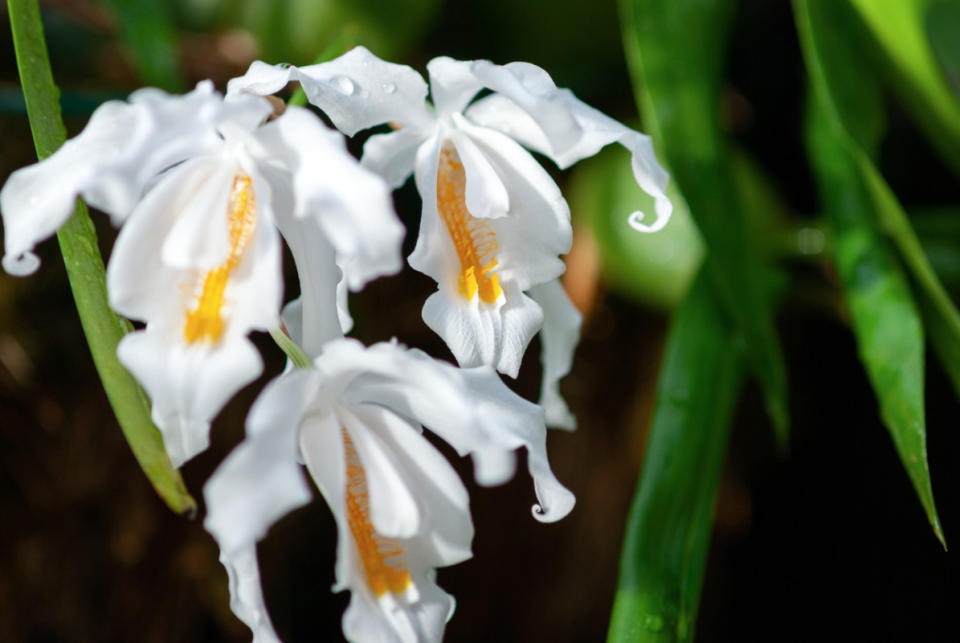
iStock
20. Bird in Flight Orchids (Coelogyne Orchid)
This flower has white petals and its lip starts out very dark and fades into a lighter rusty orange hue. Each spike on this plant produces one flower at a time that resembles a bird flying.
Care Guide
Light: Strong, but not direct sunlight from an east-facing window
Temperature: 50 to 80°F during the day, 55 to 65°F at night
Height: Up to 8 inches
Water: Once a week or when the soil is dry
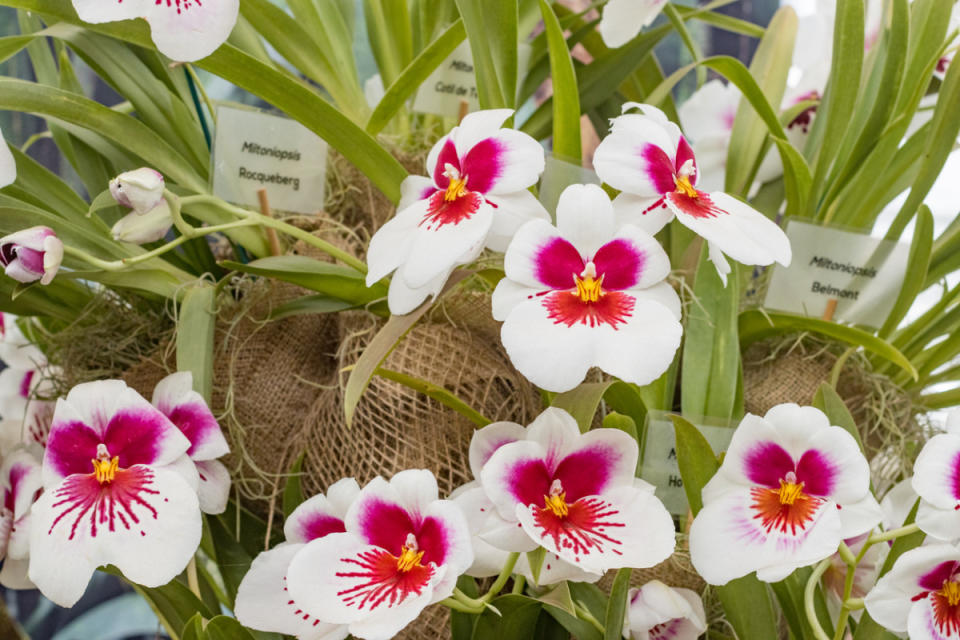
iStock
21. Pansy Orchids (Miltonia Orchids)
Don’t mistake these cute orchids for garden pansies, though they do have a striking resemblance to them.
Care Guide
Light: Bright, indirect light from an east or south-facing window
Temperature: 75 to 85°F during the day, 60 to 65°F at night
Height: Up to 2 feet
Water: Once a week when soil is almost dry
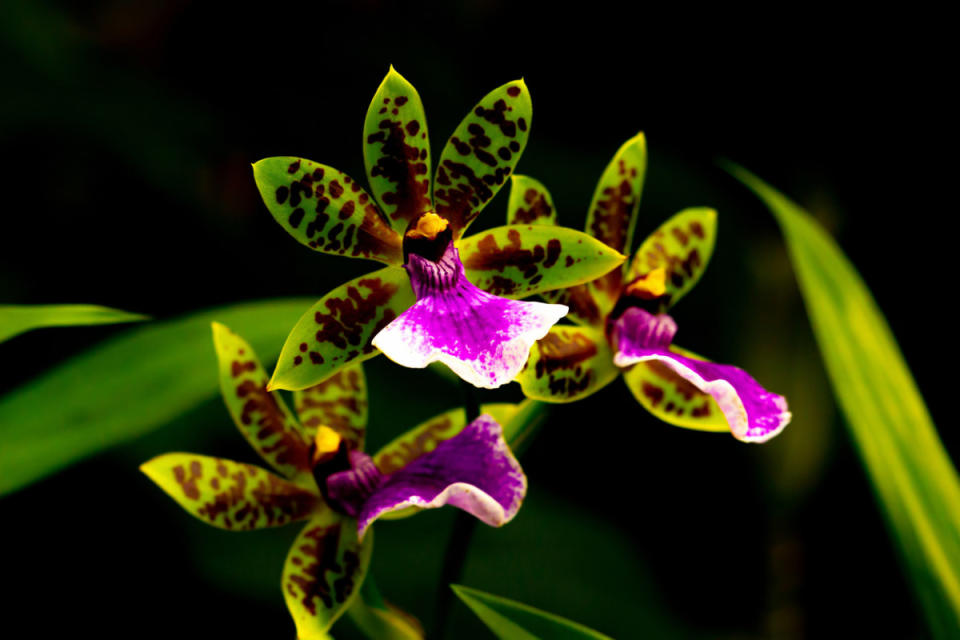
iStock
22. Zygo Orchids (Zygopetalum Orchids)
These waxy-looking flowers are usually brown and green striped or speckled, with purple, maroon or fuchsia lips.
Care Guide
Light: Bright, indirect light from an east-facing window
Temperature: 70 to 75°F during the day, 58 to 62°F at night
Height: 1 to 2 feet
Water: Two to three times a week until flowers bloom, then once a week
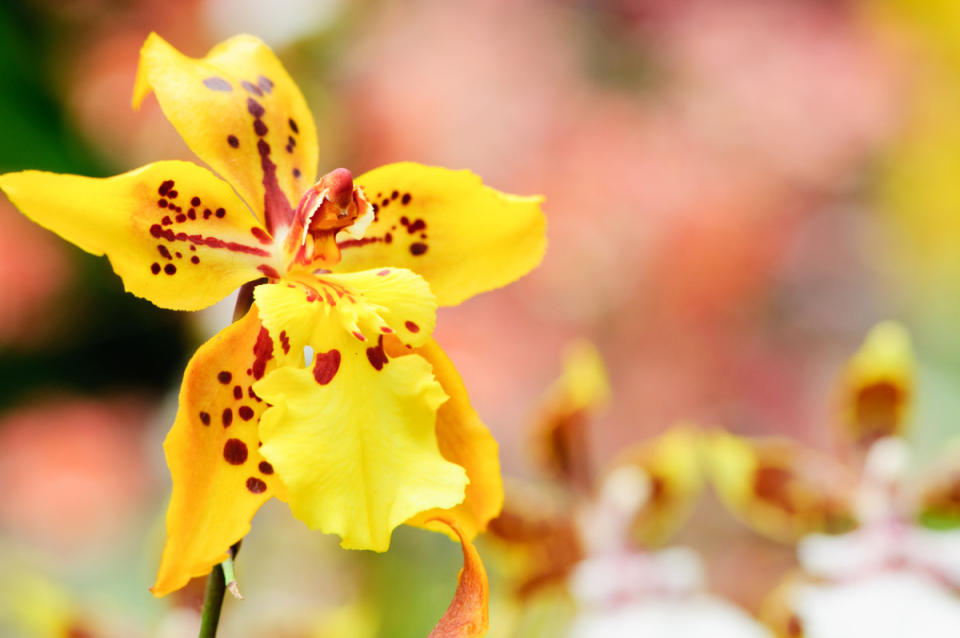
iStock
23. Dancing Lady Orchids (Oncidium Orchids)
When looking at this orchid, many say it resembles a dancing lady because its petals and sepals are ruffled and spread out, in a dress-like shape. You’ll find them mainly in a sunny yellow shade or a deep pink hue.
Care Guide
Light: Bright indirect light from an east or south-facing window
Temperature: 70 to 85°F during the day, 60 to 65°F at night
Height: Up to 30 inches
Water: Three times a week, keep moist
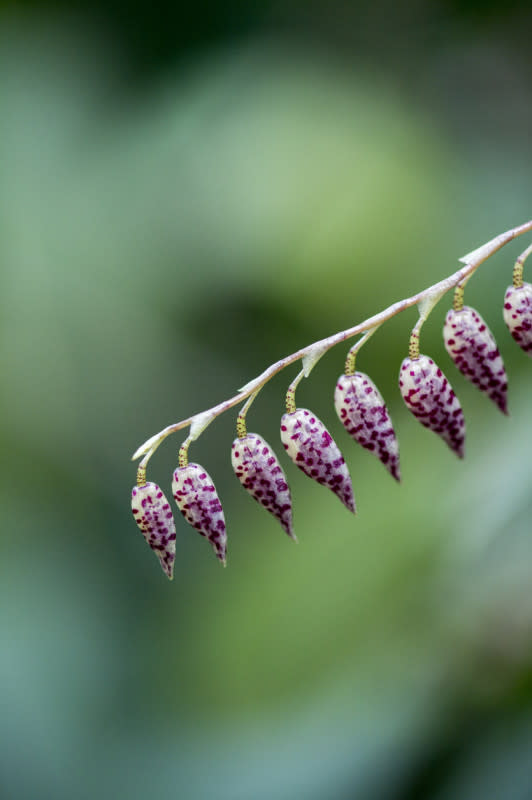
iStock
24. Bonnet Orchids (Pleurothallis Orchid)
These beauties get their name from their hooded, bonnet-shaped labellum, which can be greenish to lilac in color and have maroon veins running through it.
Care Guide
Light: At least six hours of light from an east or south-facing window
Temperature: 65 to 75°F during the day, 50 to 60°F at night
Height: 6 to 16 inches
Water: Once a week or when soil is dry
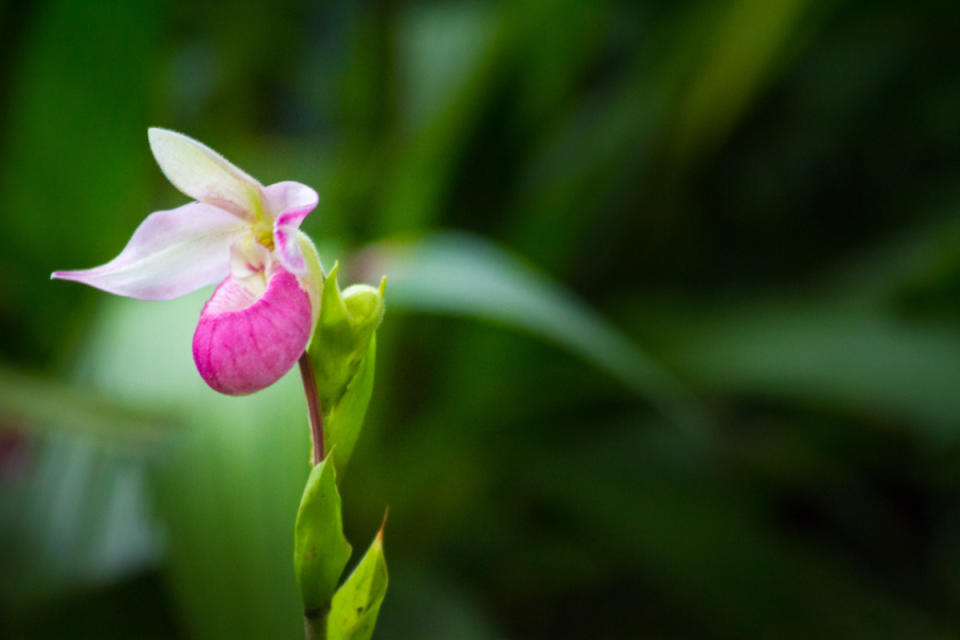
iStock
25. Showy Lady Slipper Orchids (Cypripedium Reginae Orchids)
With large leaves, flat, oblong white petals and a deep magenta labellum, these orchids are gorgeous. They are native to the Northern United States and bloom between May and June.
Care Guide
Light: Bright, indirect light from am east or south-facing window
Temperature: 70 to 80°F during the day, 60 to 65°F at night
Height: 1 to 3 feet
Water: Early mornings, twice a week
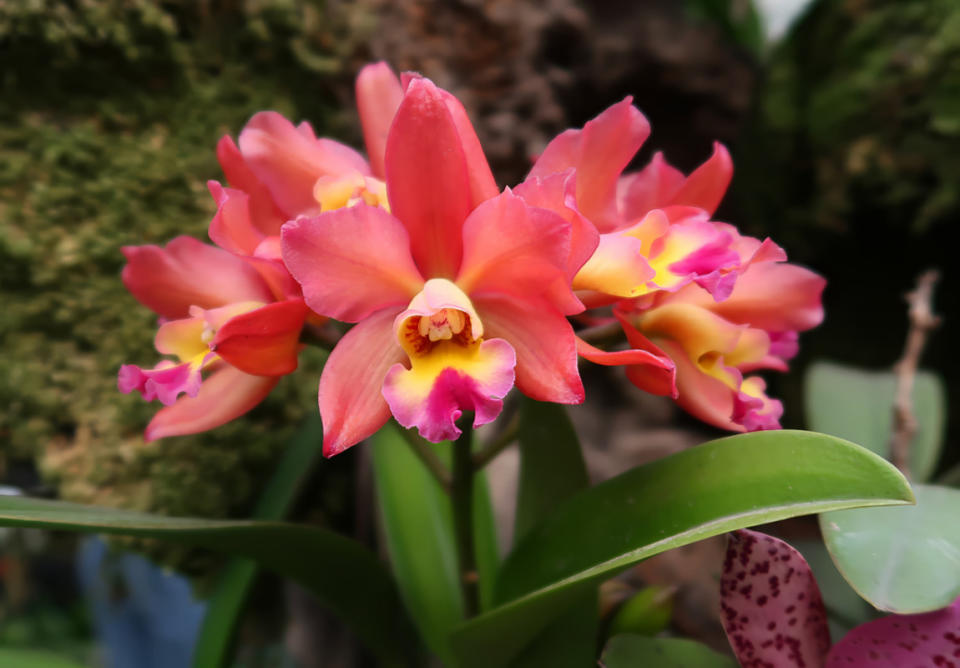
iStock
26. Corsage Orchids (Cattleya Orchids)
This flower is native to South America. It’s known for its large, fragrant flowers that range in a variety of colors, including purple.
Care Guide
Light: Bright, indirect light from an east or south-facing window
Temperature: 70 to 80°F during the day and 60 to 64°F at night
Height: Up to 2 feet
Water: About once a week (however, when spikes are growing you can water it more)
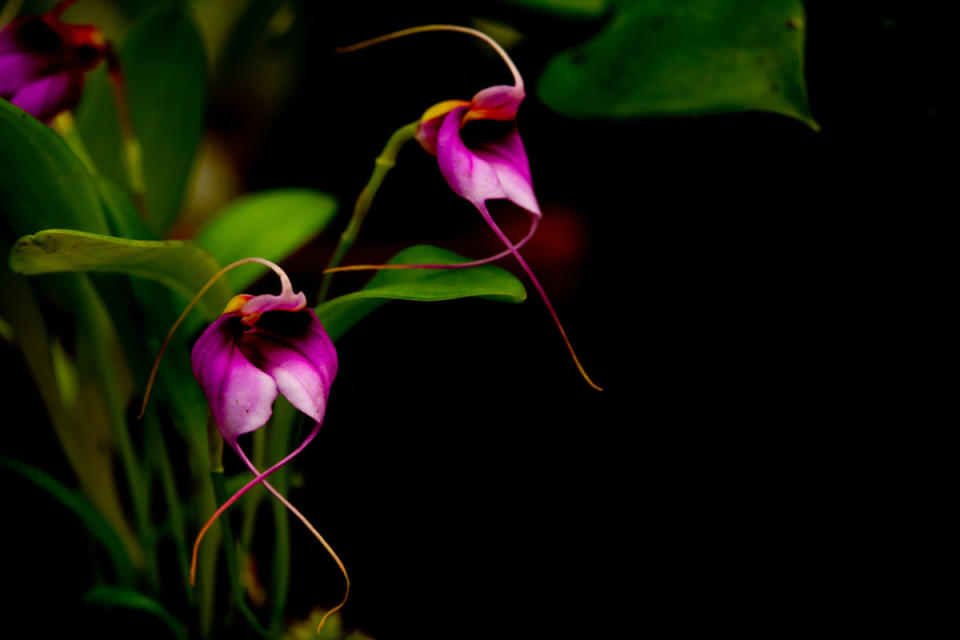
iStock
27. Flag Orchids (Masdevallia Orchids)
You’ll find these orchids growing in forests at high elevations in Mexico and South America. Their petals are triangular-shaped with long tails and come in vibrant shades.
Care Guide
Light: Indirect light for about 16 hours from an east-facing window
Temperature: 65 to 75°F during the day, 55 to 60°F at night
Height: 1 inch to 1 foot
Water: Twice a week or whenever the soil is dry
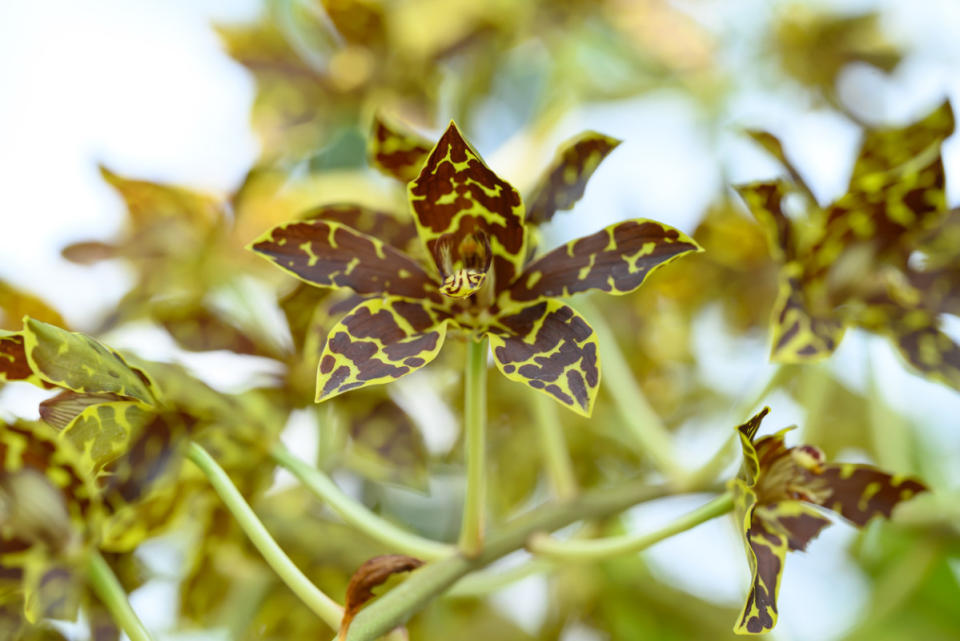
iStock
28. Showy Tiger Orchids (Grammatophyllum Orchids)
These orchids have golden yellow petals with reddish-brown stripes that look similar to a tiger’s coat. They are the largest type of orchid species and are in The Guinness Book of World Records for being the tallest flower stalk orchids.
Care Guide
Light: Bright, indirect sunlight for 12 hours from an east-facing window
Temperature: 65 to 75°F during the day, 55 to 60°F at night
Height: Up to 25 feet
Water: Once a week or once every 10 days
Next: What Is Your Birth Flower? Find Out the Meaning Behind the Blooms for Each Month
